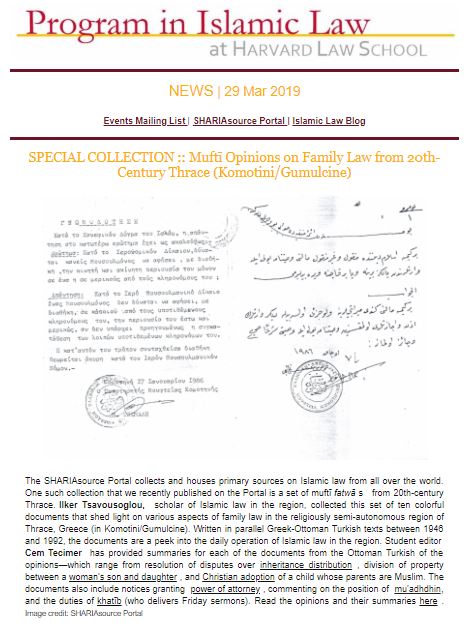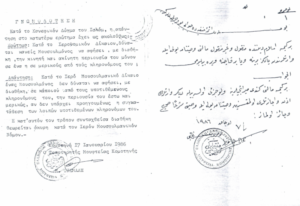
 SPECIAL COLLECTION :: Muftī Opinions on Family Law from 20th-Century Thrace (Komotini/Gumulcine)The SHARIAsource Portal collects and houses primary sources on Islamic law from all over the world. One such collection that we recently published on the Portal is a set of muftī fatwā s from 20th-century Thrace. Ilker Tsavousoglou, scholar of Islamic law in the region, collected this set of ten colorful documents that shed light on various aspects of family law in the religiously semi-autonomous region of Thrace, Greece (in Komotini/Gumulcine). Written in parallel Greek-Ottoman Turkish texts between 1946 and 1992, the documents are a peek into the daily operation of Islamic law in the region. Student editor Cem Tecimer has provided summaries for each of the documents from the Ottoman Turkish of the opinions—which range from resolution of disputes over inheritance distribution , division of property between a woman’s son and daughter , and Christian adoption of a child whose parents are Muslim. The documents also include notices granting power of attorney , commenting on the position of mu’adhdhin,and the duties of khatīb (who delivers Friday sermons). Read the opinions and their summaries here. Image credit: SHARIAsource Portal
SPECIAL COLLECTION :: Muftī Opinions on Family Law from 20th-Century Thrace (Komotini/Gumulcine)The SHARIAsource Portal collects and houses primary sources on Islamic law from all over the world. One such collection that we recently published on the Portal is a set of muftī fatwā s from 20th-century Thrace. Ilker Tsavousoglou, scholar of Islamic law in the region, collected this set of ten colorful documents that shed light on various aspects of family law in the religiously semi-autonomous region of Thrace, Greece (in Komotini/Gumulcine). Written in parallel Greek-Ottoman Turkish texts between 1946 and 1992, the documents are a peek into the daily operation of Islamic law in the region. Student editor Cem Tecimer has provided summaries for each of the documents from the Ottoman Turkish of the opinions—which range from resolution of disputes over inheritance distribution , division of property between a woman’s son and daughter , and Christian adoption of a child whose parents are Muslim. The documents also include notices granting power of attorney , commenting on the position of mu’adhdhin,and the duties of khatīb (who delivers Friday sermons). Read the opinions and their summaries here. Image credit: SHARIAsource Portal
 CASE:: Molla Sali v. Greece (ECHR 2018): The European Court of Human Rights Rules Against Forcing Greek Muslim Minority to Follow Islamic Law In December 2018, the European Court of Human Rights (ECHR) considered the question whether Muslim citizens who lived in the Greek province of Thrace could be required to submit to the jurisdiction of Islamic law, as detailed by local experts called muftīs. In Greek law, Islamic law usually governs matters of family law—such as marriage, divorce, and inheritance—in cases involving the Muslims in Thrace. In this case, the ECHR examined a Muslim man’s will, which left all his property to his wife to the exclusion of his sisters, who challenged the testator on the grounds that muftīs’ authority in the region had been improperly circumvented. The Court determined that Muslims could not be forced to follow that authority. Read the full summary by Marzieh Tofighi Darian. Image credit: Wikipedia
CASE:: Molla Sali v. Greece (ECHR 2018): The European Court of Human Rights Rules Against Forcing Greek Muslim Minority to Follow Islamic Law In December 2018, the European Court of Human Rights (ECHR) considered the question whether Muslim citizens who lived in the Greek province of Thrace could be required to submit to the jurisdiction of Islamic law, as detailed by local experts called muftīs. In Greek law, Islamic law usually governs matters of family law—such as marriage, divorce, and inheritance—in cases involving the Muslims in Thrace. In this case, the ECHR examined a Muslim man’s will, which left all his property to his wife to the exclusion of his sisters, who challenged the testator on the grounds that muftīs’ authority in the region had been improperly circumvented. The Court determined that Muslims could not be forced to follow that authority. Read the full summary by Marzieh Tofighi Darian. Image credit: Wikipedia
 SOURCES :: Islamic Law in GreeceSHARIAsource’s Special Collections aim to facilitate research for Islamic law and comparative law scholars. In addition to primary sources that contextualize Islamic law’s contemporary history in Thrace, the Greek region from which Molla Sali v. Greece emerged, the Portal provides sources on the larger context of the Greek legal system. See the Greece Country Profile (in the Country Profiles Special Collection) to see proposed legislation ” designed to prioritize Greek civil law over religious (namely Islamic) family law,” the Greek constitution , and the fuller profile of Greece and its legal system. Image credit: Wikipedia
SOURCES :: Islamic Law in GreeceSHARIAsource’s Special Collections aim to facilitate research for Islamic law and comparative law scholars. In addition to primary sources that contextualize Islamic law’s contemporary history in Thrace, the Greek region from which Molla Sali v. Greece emerged, the Portal provides sources on the larger context of the Greek legal system. See the Greece Country Profile (in the Country Profiles Special Collection) to see proposed legislation ” designed to prioritize Greek civil law over religious (namely Islamic) family law,” the Greek constitution , and the fuller profile of Greece and its legal system. Image credit: Wikipedia
See the full newsletter.

